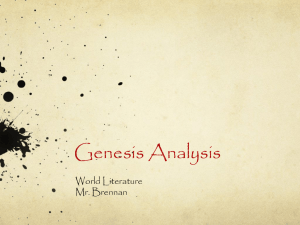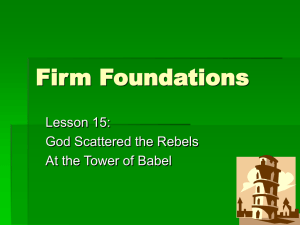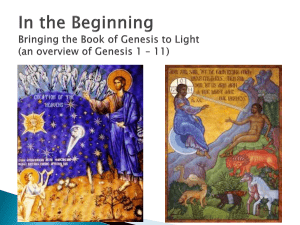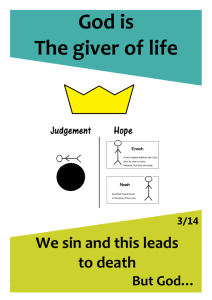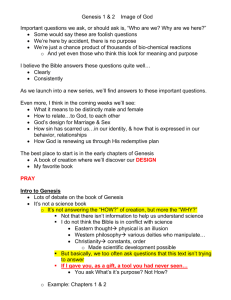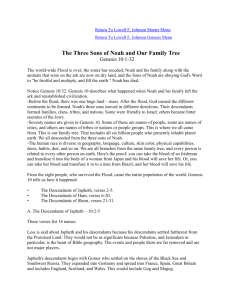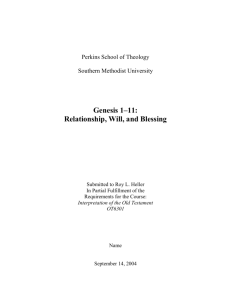Genesis 1-11 Lesson Book - Prairie Village Church of Christ
advertisement
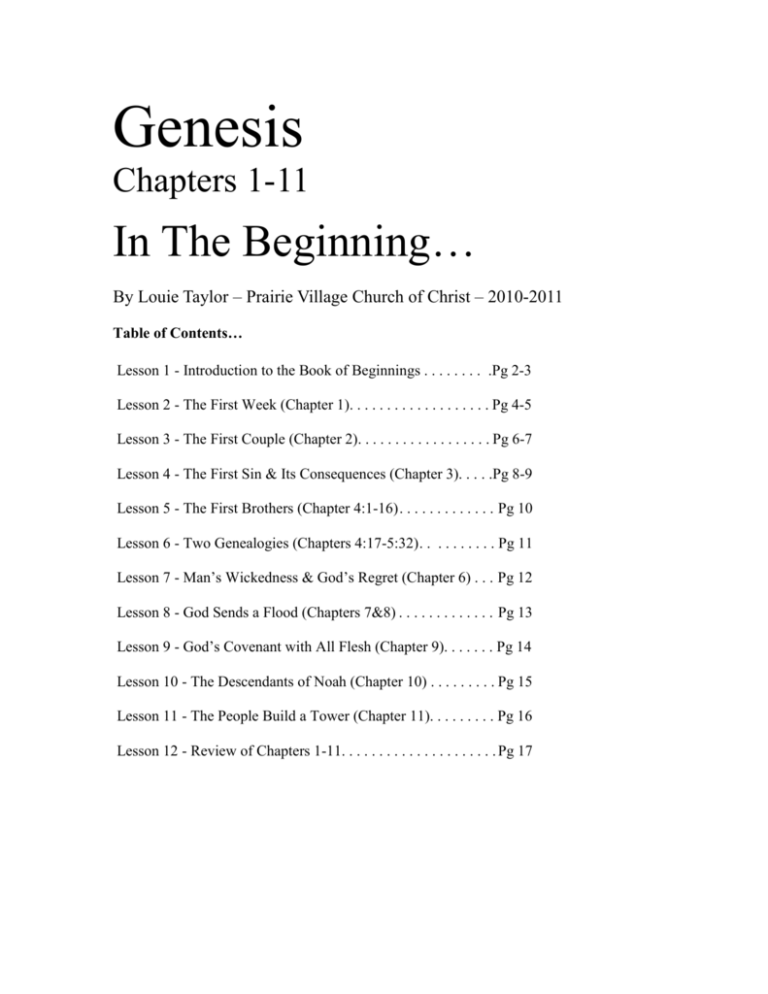
Genesis Chapters 1-11 In The Beginning… By Louie Taylor – Prairie Village Church of Christ – 2010-2011 Table of Contents… Lesson 1 - Introduction to the Book of Beginnings . . . . . . . . .Pg 2-3 Lesson 2 - The First Week (Chapter 1). . . . . . . . . . . . . . . . . . . Pg 4-5 Lesson 3 - The First Couple (Chapter 2). . . . . . . . . . . . . . . . . . Pg 6-7 Lesson 4 - The First Sin & Its Consequences (Chapter 3). . . . .Pg 8-9 Lesson 5 - The First Brothers (Chapter 4:1-16) . . . . . . . . . . . . . Pg 10 Lesson 6 - Two Genealogies (Chapters 4:17-5:32) . . . . . . . . . . Pg 11 Lesson 7 - Man’s Wickedness & God’s Regret (Chapter 6) . . . Pg 12 Lesson 8 - God Sends a Flood (Chapters 7&8) . . . . . . . . . . . . . Pg 13 Lesson 9 - God’s Covenant with All Flesh (Chapter 9). . . . . . . Pg 14 Lesson 10 - The Descendants of Noah (Chapter 10) . . . . . . . . . Pg 15 Lesson 11 - The People Build a Tower (Chapter 11). . . . . . . . . Pg 16 Lesson 12 - Review of Chapters 1-11. . . . . . . . . . . . . . . . . . . . . Pg 17 Lesson 1—Introduction to the Book of Beginnings About Genesis “Genesis” is from a Greek word meaning “history of origin”. The Hebrew title is “Bereshith” which means “in the beginning.” If you were able to trace your family tree all the way back to the beginning of time, Genesis (the beginning) is where you’d end up. Moses wrote the first five books of the Bible (known as the Pentateuch) including Genesis, in around 1500 B.C. Jesus gave Moses credit for writing the first 5 books of the Bible (Mark 7:10; 12:26; Luke 24:44; John 5:46-47; see Acts 15:1). Genesis consists of 50 chapters with 3 major divisions 1. Chapters 1-11 – From Creation to Abraham – the father of Israel. 2. Chapters 12-36 – Abraham, Isaac & Jacob – the patriarchs of Israel. 3. Chapters 36-50 – the story of Joseph, the son of Jacob (Israel). Section 1– Genesis chapters 1-11 Chapter 1 – The story of Creation. Chapters 2&3 – The story of Adam & Eve in the Garden of Eden. Chapter 4 – The story of Cain and Abel. Chapters 4&5 – 2 genealogies illustrating the spread of humanity. Chapters 6-9 – The story of Noah & the Flood. Chapter 10 – Genealogies of Noah’s descendants after the Flood. Chapter 11 – The story of the Tower of Babel. Section 2 – Genesis chapters 12-36 Chapters 12-24 – The life of Abraham. Chapters 25-27 – The life of Isaac. Chapters 28-35 – The life of Jacob (Israel). Chapter 36 – The descendants of Esau (Jacob’s twin brother). Section 3 – Genesis chapters 36-50 (the life of Joseph) Chapter 37 – Joseph and his family. Chapter 38 – Judah and Tamar. Chapters 39-41 – Joseph’s success in Egypt. Chapters 42-47 – Jacob’s migration to Egypt. Chapters 48-50 – Jacob’s final days. Chapter 50 – Joseph’s final days. Questions 1) Who wrote the book of Genesis? 2) What are some important lessons we can learn from this book? 2 3) Can we read about Jesus in the book of Genesis? 4) How does Genesis help us understand Jesus better? 5) Genesis is called “the book of beginnings.” How many things can you think of that find their beginnings in this book? 6) What does the word “patriarch” mean? 7) The first five books of the Bible are called the “Pentateuch”. What does that word mean? 8) What is another name for the first five books of the Bible besides “Pentateuch”? 9) Fill in the blanks – Genesis chapters 1-11 deal with the history of ________, while chapters 12-50 deal with the history of ________. 10) Why do you think that the book of Genesis was written? 3 Lesson 2—The First Week (Chapter 1) Creation – Genesis 1:1 very simply and boldly states, “God created the heavens and the earth.” In the beginning, God brought every created thing into existence. In six days He created everything from nothing. The account of Creation is not really history, because its events predate all recorded history. It isn't science either, because science is inadequate to explain the initial cause and effects of the Universe. The account of Creation is pure inspiration from the mind of God Almighty. In six days God spoke the heavens and the earth into existence. This is a matter of faith – Heb 11:3 – “By faith we understand that the worlds were prepared by the word of God, so that what is seen was not made out of things which are visible.” Notice the rhythm & pattern of creation & the use of sets of three. On days 1-3 – God created realms or habitats. On days 4-6 – God filled those realms or habitats. On day 1 God created light – On day 4, the Sun, Moon and stars. On day 2 God created the atmosphere – On day 5, birds to fly in it. On day 3 God created dry land – On day 6 creatures to inhabit it. Day 1 – Light, day & night. Day 2 – Heaven, separating the waters above & the waters below. Day 3 – Dry land, seas & vegetation. Day 4 – Sun, Moon & stars for seasons, days & years. Day 5 – Sea monsters, swimming creatures, flying creatures. Day 6 – Cattle, creeping things & beasts of the field. Notice the crowning achievement of God’s Creation. Man was the culmination and climax of all of God’s Creation. All things were created for man to rule over in God’s place. God gave man dominion over all animal life on land and in the sea. All vegetables and fruits were made for man to eat. Even the Sun, Moon & stars were created to serve mankind (1:14). Man is the only part of creation that God created in His own image. God acknowledged the quality of all that He made – “it was good.” After God made man He was able to say “it was very good” (1:31). Questions 1) The word “God” in verse one is “elohim”. It is a plural noun that connects with singular verbs & adjectives. What does this indicate? 2) Why did God say in verse 26, let “us” make man in “our” image? 3) Did God create the heavens & earth in 6 literal day? Please explain. 4 4) Verse 2 says the earth was “formless and void”. What does this mean? 5) Why do you think the term “and God saw that it was good” is repeated so often in the Creation account? 6) Verse 14 says the lights in heaven were given as “signs”. What does this mean? (Consider Jeremiah 10:2). 7) Verse 27 says that God created man in His own image? What do you think that means? 8) What does it mean that God rested on the 7th day (Genesis 2:2-3)? Was He tired? 9) Did God order people to observe the Sabbath day in Genesis 2:3? 10) What’s the most important lesson you learned from chapter 1? 5 Lesson 3—The First Couple (Chapter 2) Post Creation – Genesis 1 is the initial account of God’s Creation. In Genesis 2:4-4:26 God gives us a glimpse at the further development of His “very good” Creation and more specific details. Genesis 2:4 speaks of the “account” or “generations” of the heavens and the earth. This Hebrew word “towledah” is used very often in Genesis and it means “generations”, “histories” or “descendants”. Creation is brought about in chapter one. Chapters 2 through 4 tell what became of it. Before man arrived on the scene… No field shrub or plant existed – desert shrubs or cultivated grains. Earth was a lush paradise – man didn’t toil by the sweat of his brow. It had not rained – the whole earth’s surface was regularly watered. Then God formed man from the dust and breathed life into him. God planted a garden and placed man in it. In the garden of Eden… Every tree grew for man’s nourishment that looked and tasted good. Grew the tree of life and the tree of the knowledge of good and evil. A river flowed to water all the vegetation. Adam was placed to cultivate and keep it. Adam was forbidden to eat the fruit of one tree on penalty of death. Animals were brought to Adam to give names to. God formed from Adam’s rib a suitable companion & helper. God instituted the bonds of marriage. Adam and Eve had everything they needed to be prosperous. Questions 1) Why were there no “shrubs of the field” and “plants of the field” on earth before the first couple sinned? 2) Was the “mist” that God sent to water the earth superior to the rain He sends today? Why? 3) Does verse 7 teach us anything about our dual nature? 4) Did God assign Adam any work to do in the garden of Eden? 5) What was the difference between man’s work before and after he sinned? (Consider Genesis 3:17-19) 6 6) Why did God bring the animals to Adam for him to name? 7) Do you think God brought every single animal to Adam to name? 8) Do you think Adam named the animals on day 6 of Creation? Why? 9) Was Eve created on day 6 of creation? (Consider Genesis 1:26-31) 10) Why was it important for Adam and Eve to not eat of the fruit of the tree of the knowledge of good and evil? 7 Lesson 4—The First Sin & Its Consequences (Chapter 3) Paradise lost – God created the first man and women innocent and free of shame, as He has created every person since. Unfortunately, along with being innocent, Eve was also gullible. The serpent was craftier than any beast of the field, but it didn’t act on its own. The Bible shows clearly that Satan was the deceiver behind the serpent (2 Cor. 11:3; Rev. 12:9; 20:2). Satan deceived Eve, and Adam was weak enough to follow her lead. When the first couple disobeyed God they unleashed a world of pain and difficulty for all people that would follow after them. How Satan deceived Eve He told her God was lying & she wouldn’t die for disobeying (V4). He told her God was withholding something good from her (V5). He appealed to the lust of her eyes and the lust of her flesh (V6). Satan deceives people the same way today as he always has done. Satan makes sin look attractive. He promises joy & delivers death. The bad consequences of the first sin Sin brought fear and shame into the lives of Adam and Eve. They tried to hide from God, which is impossible to do. They blamed others. Eve blamed the serpent. Adam blamed Eve. The serpent was cursed to slither on the ground the rest of its life. The woman would suffer in childbirth & be subject to her husband. The man would have to feed his family with great toil and sweat. The earth’s ground was cursed, no longer yielding its fruit readily. Adam and Eve would both have to die and return to the dust. Man didn’t inherit their sins, but we did inherit the consequences. Adam and Eve were also evicted from their garden paradise. Sin separated them from God as it does all people who commit sin. The good news of God’s love God would put enmity between the woman’s seed & the serpent’s. This is a direct reference to the redeeming work of Jesus. God looked ahead thousands of years to when Jesus would come. Satan would hurt Jesus, but Jesus would crush Satan. God had a plan in mind to redeem man from the moment he fell. Questions 1) Verse 1 says the serpent was more “subtil” or “crafty” than any beast of the field. What does that mean? 2) How did Satan persuade Eve to disobey God? 8 3) Why did Eve eat the fruit of the tree of the knowledge of good and evil? (Verse 13 and 2 Corinthians 11:3) 4) Why did Adam eat of the fruit after Eve did? 5) Why do you think people choose to listen to Satan instead of God? 6) Did Adam & Eve die when they ate the forbidden fruit? (Gen. 3:3) 7) How many sins does it take to separate a person from God? 8) Can you explain what verse15 means and give Scripture references to back up your answer? 9) Why did God make Adam and Eve garments of skin, and where did the skin come from? (Verse 21) 10) Why didn’t God want Adam and Eve to eat the fruit of the tree of life after they ate the fruit of the knowledge of good and evil? 9 Lesson 5—The First Brothers (Chapter 4:1-16) Life goes on – After Adam and Eve sinned and were expelled from the garden, they obeyed God’s command to be fruitful and multiply and fill the earth. They named their first two children Cain and Abel. Cain grew up and became a farmer and Abel became a shepherd. Both men offered portions of their income to God as a sacrifice. From the very beginning of man’s existence God has required worship and sacrifice. What lead to the first murder The sacrifice that Cain offered to God didn’t please God. The sacrifice Abel offered did please God and Cain became jealous. Cain was angry with God and his brother and he became sullen. As Cain was brooding, God told him to choose to do well. Cain ignored God’s counsel & responded with anger & vengeance. Because of this sin God cursed the ground that Cain farmed. Cain was forced to wander the earth for the rest of his life. Questions 1) What about Cain’s sacrifice was displeasing to the Lord? 2) What is meant by the statement that Cain’s “countenance fell”? 3) What did God mean when He said to Cain, “sin is crouching at the door, and its desire is for you”? 4) What happens to people if they don’t “master” sin? (Verse 7) 5) What “sign” or “mark” did God place upon Cain to discourage others from killing him? 10 Lesson 6—Two Genealogies (Chapters 4:17-5:32) The earth is populated – Recorded here are the accounts of the descendents of two sons of Adam & Eve – Cain & Seth. Notice the similarity between the names given to the offspring of these two forebears, but notice also the difference in their character. The descendants of Cain are listed to only the 6th generation and some earthly accomplishments are mentioned. Seth and his descendants were the people of God. The differences in the genealogies Lamech (from Cain) was a brute and killer and the first polygamist. Jubal (from Cain) was the father of those who play the lyre & harp. Tubal-Cain (from Cain) was a forger of bronze & iron implements. Enosh (from Seth) began to call upon the name of the Lord. Enoch (from Seth) walked with God and God took him. Lamech (From Seth) became the father of Noah, a righteous man. The ages of Seth’s descendants are recorded, but not those of Cain. Questions 1) Why do you think people lived such long lives before the flood? 2) Even though some of these people lived for well over 900 years, what happened to each of them? 3) Does Genesis 5:24 teach that Enoch didn’t die? 4) What does it mean to “walk with God”? 5) Everything that God wrote in the Bible is important. What lessons can we learn from these and other biblical genealogies? 11 Lesson 7—Man’s Wickedness and God’s Regret (Chapter 6) The unrighteousness of man – About 1,000 years after God created mankind He was completely fed up with them. The people of God had dwindled to just a few, because the sons of God had children with the daughters of men. In Noah’s day, evil dwelled in the heart of nearly every person, and the earth was filled with violence, and God was sorry he made man. Noah’s family was the only righteous family left on earth, and mankind’s only chance. God told Noah to make an ark God informed Noah He was about to destroy all flesh with a flood. God gave Noah very specific instructions for constructing the ark. God specified the dimensions, type of wood and that pitch be used. God told Noah to put two of every kind of animal on board. God told Noah to take plenty of food for the people and animals. God allowed Noah to take no other people on board but his family. Noah did all that God commanded him (Verse 22). Questions 1) Who were the “sons of God and the daughters of men” and why did the sons of God take the daughters of men? 2) What was the 120 year period God spoke of in Verse 3? 3) Did Noah only take two of every kind of animal into the ark? (7:2) 4) What did the “kinds” of animals represent? 5) Do you think it really mattered what kind of wood Noah used to build the ark and what dimensions he used? 12 Lesson 8—God Sends a Flood (Chapters 7&8) The waters rise & recede – God always rewards righteousness and punishes wickedness. With the only righteous family safely in the ark and all the wicked world outside and doomed to destruction, God covered the whole earth with water. He broke open the fountains of the deep and the clouds from above, and it rained 40 days and nights. Then after 150 more days, God caused the waters to begin to recede. When the ark finally rested on Ararat, and Noah and his family and all the animals set foot on dry land, they had been in the vessel for one full year. After the flood Noah released the animals to breed and multiply on the earth. Noah built an altar and sacrificed birds and clean animals to God. The Lord was pleased with Noah’s burnt offering. God purposed in His heart to never destroy all life on earth again. The earth won’t last forever, but while it does, life will continue. Noah lived for 350 more years after the flood (Genesis 9:28). Questions 1) Why was Noah commanded to take seven each of every clean animal and every bird of the air into the ark? 2) What are the fountains of the great deep? 3) How old was Noah when he entered the ark and when he exited it? 4) Does Genesis 8:1 indicate that God had forgotten Noah and the inhabitants of the ark? 5) What do you think Genesis 8:22 means? 13 Lesson 9—God’s Covenant with All Flesh (Chapter 9) Never again – Before God destroyed everyone and everything on the earth (dry land) with a flood, He made a covenant with Noah and his family to preserve and bless them (Genesis 6:18). After the flood, God also extended the covenant blessings to all people who would come after Noah, and even to all the animals that would replenish the Earth. God promised He would never again cut off all flesh, nor would He destroy all the land by flood waters. The sign and reminder of this covenant God made with you is His spectacular rainbow. Laws for the covenant and the new world order All animals live in terror of, and are food for mankind. God prohibited the consumption of blood. God instituted capital punishment for murderers. Canaan’s curse Ham looked upon his father’s nakedness. Ham’s son, Canaan, was cursed as a consequence. Canaan was doomed to be the lowliest of servants. Questions 1) Why do you think Noah became a farmer (Verse 20)? 2) What was so terrible about Ham’s sin? 3) When Noah awoke, how did he know what Ham had done? 4) Why was Canaan cursed for Ham’s sin? 5) Did Canaan actually become servant to Shem and Japheth? 14 Lesson 10—The Descendants of Noah (Chapter 10) Nowhere else – The account of Noah’s descendants is unique among all recorded history. No other source but the Bible can accurately trace mankind’s roots all the way back in time to the cataclysmic flood that destroyed and refreshed the Earth. Only revelation from the mind of God Almighty could have produced such a remarkable record of the ancient ancestry of every person on Earth. Notable descendants from Noah’s sons From Japheth – Madai, Javan & Tarshish. From Ham – Cush, Put, Canaan & Nimrod. From Shem – Asshur, Joktan & Eber. Noah’s sons give rise to the nations of the world From Madai – The Medes // From Javan – The Greek people. From Tarshish – The Spanish people. From Cush – The Ethiopians // From Mizraim – The Egyptians. From Nimrod – The Babylonians // From Asshur – The Assyrians. From Joktan – The tribes of Arabia // See map on pages 20-21 Questions 1) What are the coastlands (isles) of the nations (Verse 5)? 2) What are some nations that arose from the sons of Ham? 3) Can you guess which people took their name from Eber? 4) What do you think “the earth was divided” means (Verse 25)? 5) From which of Noah’s three sons did Jesus descend? 15 Lesson 11—The People Build a Tower (Chapter 11) Time to move – In Genesis 9:1, God blessed Noah and his sons and told them to “be fruitful and multiply, and fill the earth.” In Genesis chapter 11, a considerable time later, all the people on earth had “journeyed east” but they were still all in one place together. God took matters into His own hands and “scattered them abroad over the whole face of the earth” so they would multiply and fill it. Why God confused their languages They stubbornly refused to obey God’s will for them They could have done anything they purposed to do (Verse 6). Their potential to do evil was very great. With poor communication they were less likely to stay together. The descendants of Shem Shem’s genealogy in Genesis 10 is general and brief. The genealogy in chapter 11 is specific & lengthy – 10 generations. This genealogy is a family register focused on one man. Through Abram (Abraham) God kept His promise to redeem man. Questions 1) What one language do you suppose everyone spoke (Verse 1)? 2) What three things did the people purpose to do (Verse 4)? 3) What is the significance of building a tower? 4) What does the word “Babel” mean? 5) How were Lot and Sarai related to Abram? 16 Lesson 12—Review of Chapters 1-11 1) What does the word “Genesis” mean? 2) Can you list in order the things God created on days 1 through 6? 3) Why was it important that Adam & Eve not eat the forbidden fruit? 4) How did Satan persuade Eve to disobey God? Why did Adam sin? 5) Did Adam & Eve die when they ate the forbidden fruit? Explain. 6) Why didn’t Cain’s offering please God? Explain Genesis 4:7. 7) What does it mean to “walk with God”? Explain Genesis 5:24. 8) Why did God destroy the earth with a flood? Will He do it again? 9) What was so terrible about Ham’s sin (Genesis 9:22)? 10) From which of Noah’s three sons did Jesus descend? 11) What three things did the people purpose to do in Genesis 11:4? 12) Who is the focus of the genealogy of Genesis chapter 11? Why? 17
